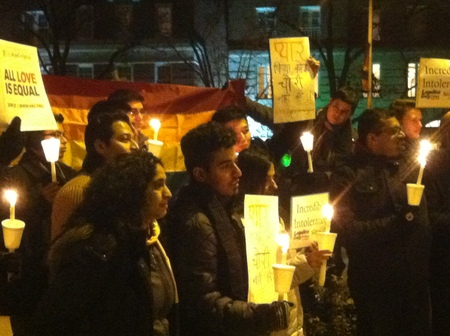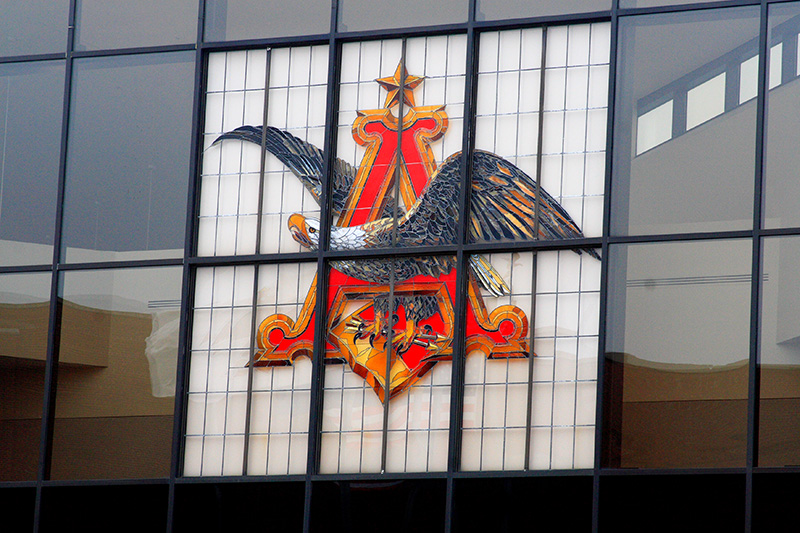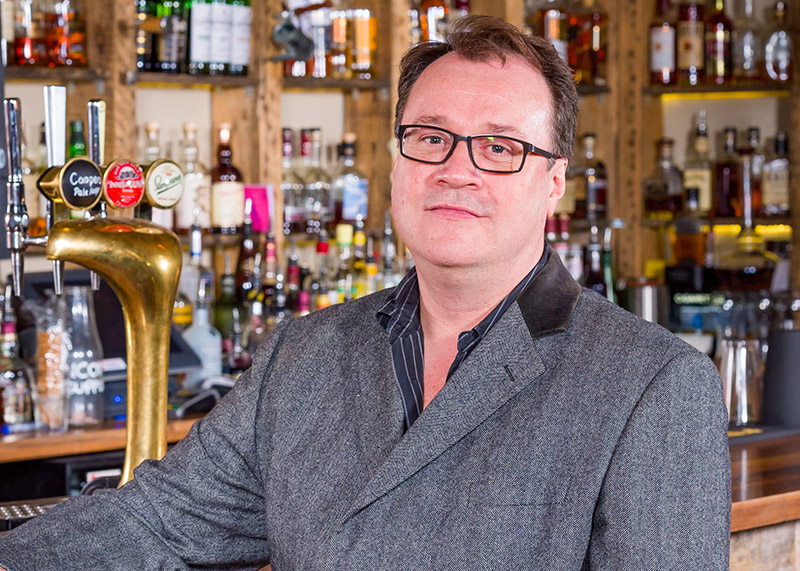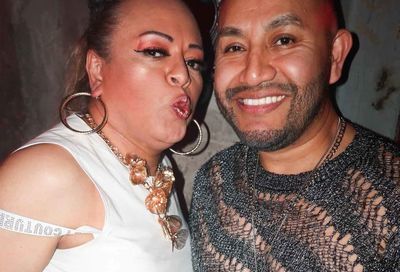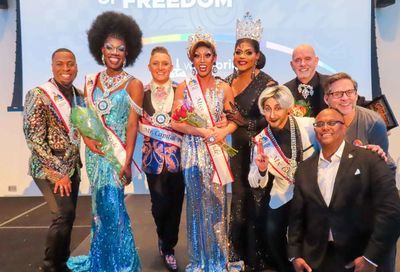D.C. activists join Friday protest against India sodomy ruling
About 25 protesters, most affiliated with the LGBT South Asian group KhushDC, gathered in front of the Indian Embassy off Dupont Circle Friday night for a candlelight vigil to express disapproval of the Dec. 11 decision by India’s Supreme Court to reactivate Section 377 of the Indian Penal Code, which bans “unnatural offenses against the order of nature” and potentially carries a sentence of up to life imprisonment.
Section 377, also known as the sodomy law, was a ban on homosexual sex imposed during British colonial rule of the Indian subcontinent. While the intent was primarily intended to deal with homosexuality, the law also applies to non-procreative acts such as fellatio between heterosexual partners.
The protesters, including some Indian citizens, criticized the court’s ruling, which effectively overturned a 2009 decision by the Indian High Court of Delhi finding that Section 377 is unconstitutional. Placing a gay-pride flag in the hand of the statue of Mahatma Gandhi in the park opposite the Indian embassy, the protesters held candles and signs visible to workers leaving the embassy. Similar demonstrations were held simultaneously in cities across the U.S. and Canada as a show of solidarity with India’s LGBT community.
“We are together because we want to show the strength of our community, and how many have been upset by the incredibly intolerant decision by the Supreme Court of India,” KhushDC President Sapna Pandya told the crowd. “The reason why we’re all standing here with lights, of course, is because our feeling is that we could maybe lend a little bit of light to the Indian government. The decision by the Supreme Court proves that we’re stepping back a little bit, that we’re actually stepping back into the darkness. We’re hoping that, as with the independence movement, [this will be] a sort of second independence, if you will, bringing independence and freedom to the LGBT community not only in India, but in all former Commonwealth countries.”
Speaking with Metro Weekly, Pandya noted that the Indian government has the option of petitioning the court to have the decision re-litigated by the full 31 members of the court. The Section 377 ruling, in contrast, was decided by two conservative judges alone.
Tushar Malik, originally from New Delhi and who moved to D.C. three months ago for a yearlong fellowship with the Human Rights Campaign (HRC), says he came out to his family following the 2009 Delhi High Court’s decision against Section 377. He labeled the Supreme Court’s new ruling “horrible.”
“I heard the High Court’s decision that said that I was no longer a criminal, [but] a law-abiding, respectful citizen of India,” Malik says of the 2009 ruling. “I felt that India finally thought that I was an equal citizen. Today, I know again that I am a criminal. I cried to my mom the night this happened. I barely slept. I was here Thursday with my friends, protesting. … I am 100 percent sure that we will not stop until we are equal, respectable – not second-class citizens, but equal citizens.”
Speaking with Metro Weekly, Malik particularly criticized India’s anti-gay politicians and agitators who point to advances in LGBT equality as a byproduct of “Western influence.” He pointed out, “The only Western import to India still standing is Section 377.”
Harjant Gill, an anthropologist who teaches at Towson University, also addressed the crowd.
“I think it’s incredibly important that we not allow the Supreme Court and the dominant discourses in India to label us as criminals,” he said. “We’re not criminals, and the fact that the Delhi High Court judgment has been thrown out doesn’t mean we’re criminals again. It’s really important that when you talk to people in India, that we move away from this discourse of being a criminal or criminalizing ourselves.”
“The other important thing to emphasize is that Section 377 and the sodomy laws doesn’t only affect the LGBT community. It also impacts straight people and their sexual lives in India,” Gill continued. “Given that India is a country that is dealing with an incredibly large amount of sexual assault against women, it doesn’t help when you talk about sexuality and turn it into something that’s secret, that’s shameful, that’s something that needs to be criminalized. So it’s really important that we really emphasize that this is a decision that’s terrible for all people, not just the LGBT South Asian community.”
Pandya said she envisions ongoing protests at least until the embassy, the foreign secretary, or the Indian ambassador issue some positive response.
“What I keep hearing from my friends in India is the amazing sense of solidarity that they’re feeling from everybody,” Pandya said. “So thank you for being here tonight, and thank you for keeping up the pressure, because, unfortunately, this might have to be a long road ahead. … We know we’re stepping into the light, not into the darkness, not back into the closets.”
[Photo: Protesters assembled at the Embassy of India, Washington, D.C. / by John Riley]
Support Metro Weekly’s Journalism
These are challenging times for news organizations. And yet it’s crucial we stay active and provide vital resources and information to both our local readers and the world. So won’t you please take a moment and consider supporting Metro Weekly with a membership? For as little as $5 a month, you can help ensure Metro Weekly magazine and MetroWeekly.com remain free, viable resources as we provide the best, most diverse, culturally-resonant LGBTQ coverage in both the D.C. region and around the world. Memberships come with exclusive perks and discounts, your own personal digital delivery of each week’s magazine (and an archive), access to our Member's Lounge when it launches this fall, and exclusive members-only items like Metro Weekly Membership Mugs and Tote Bags! Check out all our membership levels here and please join us today!

